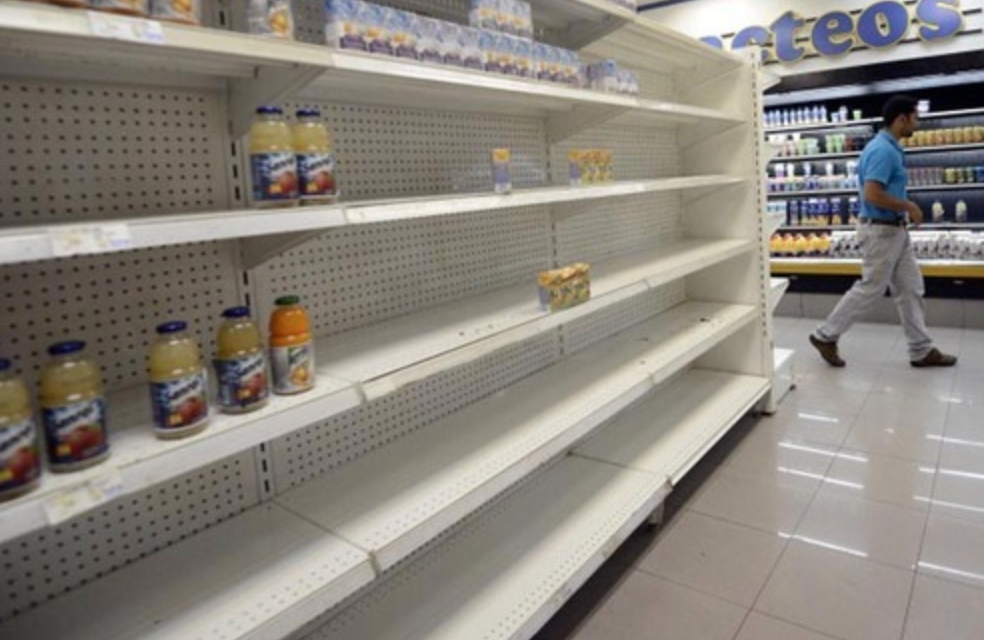In our first post we explained the apparent paradox of shortages in a time of increased consumption, suggesting that the core problem was Venezuela’s ever increasing dependence on imports confronted by a finite supply of dollars. While GDP per capita only grew by 15% between 1998 and 2012, private consumption experienced an increase of 55%. This gap was covered by a fourfold increase in imports.
In this post we will look at what the Maduro government has been doing to address the shortages.
The government’s first effort has been to increase production by engaging the private sector–ranging from public accusations to open collaboration, frequently at the same time.
The most visible example came when Maduro publicly called-out Lorenzo Mendoza, owner of agroindustrial giant Polar Industries, for “reducing production and hiding products to create scarcities.” Mendoza responded the following day suggesting that they were producing at 100% of capacity while the government’s expropriated industries were producing at 40% of capacity. Indeed the meeting itself turned into one of collaborative agreements rather than mutual accusations.
The government has been conducting meetings with other domestic producers with the same goal. It has recently announced a series of structural measures to combat scarcity, among which are multimillion dollar investments, subsidies and tax exemptions. Specifically, the government exonerated the primary sector from some income taxes, invested BF 2,000 million in vegetable and subsidized sugar production (BF 1,76 per kilo of sugar given to the producer), among other policies. The government’s effort in dealing with producers’ demands have been recognized by national organizations such as FEDEAGRO (Confederation of Agricultural Production Associations), especially for its adjustment of controlled prices for products such as chicken, beef and milk, although price adjustments in other goods are also needed.
Of course increasing domestic production will take months or years while shortages are a problem right now. So the government also needs to import as much as possible. A special credit from the National Assembly for the purchase of 39 million rolls of toilet paper, of course, made news all around the world. But toilet paper is not the only good that the country is desperately trying to get. Food is being imported from other Latin American countries, especially Venezuela’s partners such as MERCOSUR countries, Nicaragua and Ecuador. At the Petrocaribe meeting of June 27th, the Dominican Republic also agreed on exporting food to Venezuela. But these imports are still not enough to meet Venezuela’s demand.
The government has also sought to improve food distribution. On June 16th, President Maduro officially asked the United Nations Food and Agriculture Organization for help in the establishment of a monitoring and food supply system in Venezuela. The FAO representative of in Venezuela, Marecelo Resende, assured that the country fulfills all fundamental precepts to guarantee food security: “it has a good legal framework and a never-before-seen public distribution network.” However he suggested the real challenge was to boost production levels. Resende said technical assistance would be critical, and that the FAO would assist the Ministry of Agriculture. Other proposals include a council on food security and a monitoring desk for Venezuelan food data.
Another fundamental challenge in the short term is getting more dollars and making them more easily available for imports. In June Venezuelan Minister of Finance, Mr. Merentes, toured the U.S. and Europe in order to convince foreign investors of the health of the economy’s fundamentals and thereby lower Venezuela’s borrowing costs. Some experts suggest the government will have to issue new bonds this year.
The government is also set to relaunch a dollar auction system. After the failed attempt of the SICAD system in March—it only covered 1% of the enterprises seeking for dollars and many of those who participated in the old SICAD have still yet to receive their foreign currency—the renewed SICAD will be launched this month. With an expected regularity of two auctions per month, the new system’s main objective will be to accelerate operations and to include small and medium companies and individuals, although with restrictions, most notably the inability to pay external liabilities with the dollars obtained in the auctions. The system will be managed by the government and will effectively create a second exchange rate double or triple the official rate of 6.3 VEF/USD.
There have also been rumors about the legalization of the parallel dollar market. However, the Director of the Venezuelan Central Bank, Armando León, said that the current priority is the optimization of both CADIVI and SICAD.
Barclays Capital recently wrote a report alleging that import shortages are partly due to a lack of leadership, an underlying interest in keeping the status quo and ideological differences inside the government. While Mr. Merentes, Minister of Finance, may be more inclined toward the rebirth of some type of free-floating and open system, Mr. Giordani, Minister of Planning, along with some other important figures of Maduro’s administration, are totally opposed.
Discord inside the government has undoubtedly led to delays in the promulgation and implementation of urgent economic policies. While consumption peak season is approaching, leading economic sectors are still awaiting clear government decisions.
*Melina Sánchez Montañés studies Economics and Latin American Studies at Yale University.



